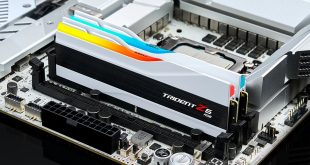Speak with the average Jo(sephine) and they will tell you that the biggest memory brands are Corsair and OCZ. Overclocking enthusiasts might also add Apacer, Geil, G-Skill, Crucial and others to the list. However, real Gurus of the Kit know different. Real KitGurus know who the big dogs are in this fight.
Globally, Kingston is so big that it's not even funny.
If we told you that in 2009, Kingston's turnover was 12 times bigger than Corsair and 150 times more than Geil, would you laugh or cry?
With sales like that, you'd think the story was done, but we haven't even reached the punch line yet. Data from the UK channel right now seems to indicate that having grown almost 40% from 2008 to 2009, Kingston is presently on track to increase revenues by almost 30% again.
Once you know the figures, you start to wonder if the Kingston logo forgot his red-domed helmet the morning they did the drawing.

All well and good, but when you consider the areas in which Kingston really isn't that strong, you realise that this growth could continue for some time to come. Where are Kingston's weaknesses? Well here at KitGuru, we believe we can see 3 areas in which Kingston is far from being a leader.
First is performance memory. While the HyperX modules look great and perform fantastically well, OCZ and Corsair has been banging in the winners with Dominator and Reaper for a long time. Kingston can do better, but it will take time. At Computex this year in Taiwan, Kingston unveiled it's 6GB, triple module, 2,333MHz memory. The fastest in the world. Still there hasn't been that much demand in the channel. With products like this, it will grow, definitely, but it will take time.

Next comes the highly-desirable SSD market. At launch, Kingston seemed unsure and partnered with Intel to create co-branded drives. Later it branched out. However, nothing it's done so far has created the kind of splash that OCZ achived with Vertex or, more recently, Crucial has with the C300 series. Kingston needs a shot of adrenaline in the engineering department [sounds painful! – Ed] and an update to its controller technology.

Lastly, it needs partners in the channel. System builders who will use Kingston as part of their standard ranges. With a lot of other components, the volume sold separately compared to the number sold inside a complete PC is around 10:1. For Kingston to succeed, it needs to be chosen as a standard component in system builders' ranges. Not an upgrade. Part of the fundamental specification.
All three of these areas will give Kingston growth. Only real question is “Can it continue to grow naturally, or will it need to start taking market share off competitors?”
KitGuru says: The says of friendly competition in the memory/SSD market are well and truly over. The next 12-24 months will be a bloodbath and we're not better against the Jugganaut in that kind of all-in-wrestling match. With millions of pounds worth of growth in the SSD market at stake, we're predicting war on a humans Vs mutants scale.
What do you think? Would you consider buying Kingston product as it is now, or do major improvements need to be made if this growth is to continue? Quick chat below, in depth over here in the KitGuru forums.
 KitGuru KitGuru.net – Tech News | Hardware News | Hardware Reviews | IOS | Mobile | Gaming | Graphics Cards
KitGuru KitGuru.net – Tech News | Hardware News | Hardware Reviews | IOS | Mobile | Gaming | Graphics Cards



they have gotten some great reviews on Kitguru I see. i like their memory.
I think kingstons biggest hurdle is to overcome their persception as a ‘lower end’ company when you compare them to say OCZ or Corsair. Its the same deal with Crucial who often get overlooked but their are one of the biggest memory manufacturers on the planet (micron is their parent company).
Size matters not. Judge me by my size do you? And well you should not!
Kingston is big because it sells loads of cheap memory. Performance RAM is an aside for them. Corsair and the like started out as performance memory makers. That is what they do best, and that is why their stuff is better.